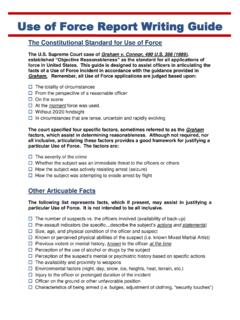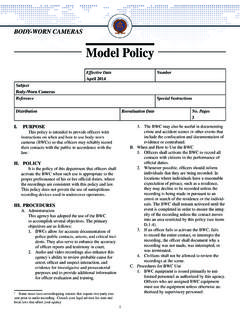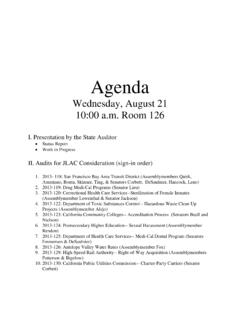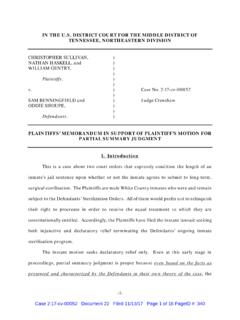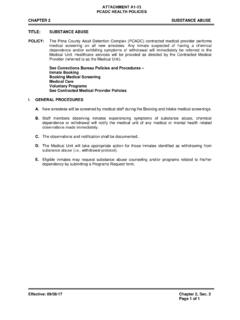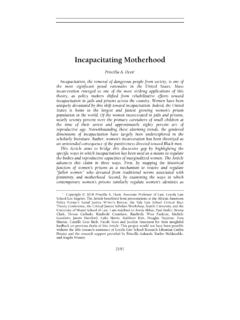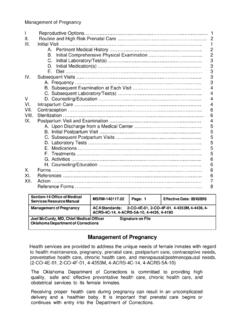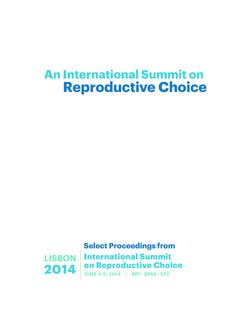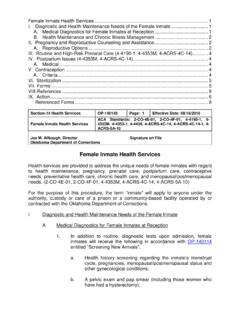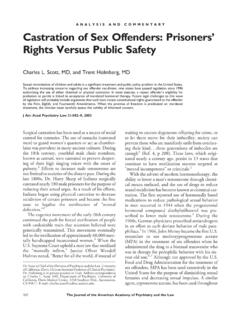Transcription of Prisoner Procreation and Abortion Issues
1 AELE Home Page --- Publications Menu --- Seminar Information ISSN 1935-0007 Cite as: 2007 (11) AELE Mo. L. J. 301 Jail & Prisoner Law Section November, 2007 Prisoner Procreation and Abortion Issues Contents 1. Introduction. 2. Prisoner Procreation 3. Prisoner Abortion 4. Relevant Resources 1. Introduction Prisons and jails nationwide often confront Issues concerning prisoners requests to marry, procreate (including through artificial insemination), or obtain an Abortion if they are pregnant during incarceration. This article attempts to briefly examine some of the important court decisions on these Issues , especially from the perspective of federal constitutional law. No attempt has been made to be exhaustive, or to summarize many particular wrinkles that may arise under applicable state law. The article also does not attempt to fully examine Issues concerning inmate divorce, conjugal visits, visitation in general, or Issues concerning childbirth, child custody, and child placement that arise when pregnant prisoners give birth while incarcerated.
2 Additionally, while at least one state [Massachusetts, see Goodridge v. Dep t of Pub. Health, 440 Mass. 309, 798 941 (2003)] and a number of foreign countries have now sanctioned same-sex marriage, and a growing number of states have recognized same sex civil unions which have many of the characteristics of marriage, the article does not attempt to address special questions that may arise out of same-sex marriage and civil unions, given the current dearth of case law on the subject as it relates to prisoners. In the final section of the article, there are links to a number of useful 301resources, including some sample policies or regulations. 2. Prisoner Procreation In additional to the right to marry, constitutional protections are extended to the right to procreate and bear children or decide not to.
3 For many prisoners, of course, the entire issue has been moot, in that incarceration, by its very nature, normally involves denial of normal intimate association with a spouse or intimate partner for such purposes (with the exception of certain correctional facilities which provide conjugal visits, family reunion programs, or similar opportunities). The development of modern reproductive assistance technology, however, including artificial insemination, has made the issue a much more immediate and practical one, and one which is clearly still very controversial. There is no definitive decision by the Supreme Court on the issue, but there are two federal appeals courts which have rejected the argument that prisoners have a constitutional right to have their semen gathered and transported out of a correctional facility for purposes of artificial insemination, although in one of the cases, the right was only rejected by a 6-5 vote.
4 In Gerber v. Hickman, #00-16494, 291 617 (9th Cir. 2002), the court ruled, by that 6-5 vote, that a Prisoner serving a sentence of 100 years to life plus eleven years had no constitutional right to provide his wife with a sperm specimen that she could use to be artificially inseminated. Gerber involved an inmate in the California state prison system who claimed that the prison in which he is incarcerated was violating his constitutional rights by not allowing him to provide his wife with a sperm specimen for that purpose. The trial court dismissed the lawsuit for failure to state a claim, ruling that a Prisoner does not have a constitutional right to procreate while incarcerated. The appeals court upheld that ruling, stating that the "right to procreate is fundamentally inconsistent with incarceration.
5 " The 41-year-old Prisoner is serving a sentence of 100 years to life plus eleven years. The state Department of Corrections prohibits family visits for inmates "sentenced to life without the possibility of parole [or] sentenced to life, without a parole date" set. No parole date has been set for the Prisoner and "due to the length of his sentence, no parole date seems likely." His lawsuit requested that he be allowed to be mailed, from a laboratory, a plastic container into which he would ejaculate, and then be allowed to return the 302container back to the lab by overnight mail. In the alternative, he requested that his lawyer be allowed to pick up the container. He offered to bear all of the costs, including any costs incurred by the correctional facility, but the prison refused to accommodate his request. In rejecting the Prisoner 's claim, the majority of the appeals court stated that "our conclusion that the right to procreate is inconsistent with incarceration is not dependent on the science of artificial insemination, or on how easy or difficult it is to accomplish.
6 Rather, it is a conclusion that stems from consideration of the nature and goals of the correctional system, including isolating prisoners, deterring crime, punishing offenders, and providing rehabilitation." The court distinguished the ruling in Skinner v. Oklahoma, No. 782, 316 535 (1942), in which a right to be free of forced surgical sterilization was recognized. "The right to procreate while incarcerated and the right to be free from surgical sterilization by prison officials are two very different things." inmates have the right to maintain their procreative abilities for "later use, not current use." Additionally, the court majority stated, while the right to marry and "many important attributes of marriage" survive incarceration, Turner v. Safley, 482 78, at 95-96 (1987), this does not include the inmate's right to consummate the marriage while in prison or to enjoy the other tangible aspects of marital intimacy.
7 The majority found it unnecessary to reach the question of whether the prison's regulation is related to a valid penological interest, holding instead that it simply didn't violate any right the Prisoner had. The court also rejected the claim that the Prisoner had a right to procreate under California law while incarcerated, or that denial of his request to artificially inseminate his wife was cruel and unusual punishment in violation of the Eighth Amendment. The denial of this request the court said, "can by no means be considered a deprivation" of the "minimal civilized measure of life's necessities." A strong dissent by five judges on the court stated that "there is absolutely nothing in the record indicating that Procreation " by itself, "the right to have a child--is fundamentally inconsistent with the fact of incarceration.
8 The majority has cited no facts to support such a conclusion and common sense does not lead to such a result." The minority argued that marital intimacy may be inconsistent with incarceration because of security concerns, but that those security concerns do not apply to artificial insemination. In another federal appeals court decision, a Bureau of Prisons' action restricting inmate Procreation , including artificial insemination of wives by male inmates was 303held to be reasonably related to legitimate governmental interest in treating all inmates equally. Goodwin v. Turner, #89-1101, 908 1395 (8th Cir. 1990). See also Percy v. Dept. of Corrections, #A-900-9312, 278 Super. 543, 651 1044 (1995) (refusal to allow New Jersey male Prisoner to artificially inseminate his wife did not violate his constitutional right to Procreation ; security concerns and scarce resources adequately justified policy).
9 In another case, a court was unsympathetic with a Prisoner s spouse who attempted to accomplish the goal of artificial insemination without seeking permission. In v. Parlavecchio, #4-CR:00-312-3192 F. Supp. 2d 349 ( Pa. 2002), the court ruled that a woman who pled guilty to providing a prohibited object to an inmate, a cryogenic sperm preservation kit intended to preserve her inmate husband's sperm, was not entitled, post-conviction, to the return of the confiscated seminal fluids. The wife was not entitled to equitable relief in the form of return of the seized property since she had "unclean hands," having bribed a correctional officer to smuggle her husband's semen out of the prison. 3. Prisoner Abortion Some female prisoners are pregnant, either because they were already pregnant when first incarcerated, or as a result of sexual activity taking place in a correctional facility, whether consensual or otherwise.
10 Under Roe v. Wade, #70-18, 410 113 (1973), and subsequent cases, the Supreme Court has upheld a constitutional right to seek to terminate a pregnancy through Abortion , subject to reasonable regulations and restrictions. What about a pregnant Prisoner seeking an Abortion ? The Supreme Court has never directly addressed this issue in a substantive opinion. In one case, however, the Court vacated a temporary stay order issued by Supreme Court Justice Clarence Thomas that prevented a Missouri prison inmate from obtaining an Abortion . The Missouri Prisoner , who was pregnant when incarcerated on a parole violation, had obtained an order from a federal trial court requiring the state to provide access to an Abortion by providing transportation to a clinic 80 miles away, despite a Department of Corrections policy under which such transportation is not provided for abortions that the Department does not deem "medically necessary.




